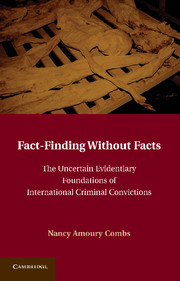 Fact-Finding without Facts
Fact-Finding without Facts Book contents
- Frontmatter
- Contents
- Acknowledgments
- Introduction
- 1 The Evidence Supporting International Criminal Convictions
- 2 Questions Unanswered: International Witnesses and the Information Unconveyed
- 3 The Educational, Linguistic, and Cultural Impediments to Accurate Fact-Finding at the International Tribunals
- 4 Of Inconsistencies and Their Explanations
- 5 Perjury: The Counternarrative
- 6 Expectations Unfulfilled: The Consequences of the Fact-Finding Impediments
- 7 Casual Indifference: The Trial Chambers' Treatment of Testimonial Deficiencies
- 8 Organizational Liability Revived: The Pro-Conviction Bias Explained
- 9 Help Needed: Practical Suggestions and Procedural Reforms to Improve Fact-Finding Accuracy
- 10 Assessing the Status Quo: They Are Not Doing What They Say They Are Doing, but Is What They Are Doing Worth Doing?
- Conclusion
- Bibliography
- Index
- References
8 - Organizational Liability Revived: The Pro-Conviction Bias Explained
Published online by Cambridge University Press: 05 October 2010
- Frontmatter
- Contents
- Acknowledgments
- Introduction
- 1 The Evidence Supporting International Criminal Convictions
- 2 Questions Unanswered: International Witnesses and the Information Unconveyed
- 3 The Educational, Linguistic, and Cultural Impediments to Accurate Fact-Finding at the International Tribunals
- 4 Of Inconsistencies and Their Explanations
- 5 Perjury: The Counternarrative
- 6 Expectations Unfulfilled: The Consequences of the Fact-Finding Impediments
- 7 Casual Indifference: The Trial Chambers' Treatment of Testimonial Deficiencies
- 8 Organizational Liability Revived: The Pro-Conviction Bias Explained
- 9 Help Needed: Practical Suggestions and Procedural Reforms to Improve Fact-Finding Accuracy
- 10 Assessing the Status Quo: They Are Not Doing What They Say They Are Doing, but Is What They Are Doing Worth Doing?
- Conclusion
- Bibliography
- Index
- References
Summary
Chapter 7 reveals that Trial Chambers take a cavalier attitude toward the testimonial deficiencies described in earlier chapters. Although Trial Chambers do discredit witness testimony that is hopelessly vague or inconsistent, they ignore many severe testimonial deficiencies, they minimize the effect of others, and they explain away still others on the basis of innocent causes. In sum, Trial Chambers often seem content to base convictions on highly problematic witness testimony. As a result of these practices, the Trial Chambers under study fail to find reasonable doubt in some of the most doubtful instances and, as a consequence, convict just about every defendant who comes before them. Indeed, a close examination of tribunal judgments and the testimony on which those judgments are said to be based appears to reveal a troubling proconviction bias.
This chapter explores the factors that contribute to that ostensible proconviction bias. I begin in Section 8.A with a discussion of politics. International criminal tribunals are intensely political institutions. From the very fact of their creation to their budgets, their estimated life spans, the targets of their investigations, and the selection of defendants over which they gain custody, global politics plays a role. Political considerations rarely appear to govern the disposition of particular cases; but, as I discuss in Section 8.A, they do operate indirectly to bias the Trial Chambers in favor of conviction. In Section 8.B, I turn to the backgrounds of the judges and explore the ways in which they might contribute to the proconviction bias.
- Type
- Chapter
- Information
- Fact-Finding without FactsThe Uncertain Evidentiary Foundations of International Criminal Convictions, pp. 224 - 272Publisher: Cambridge University PressPrint publication year: 2010


